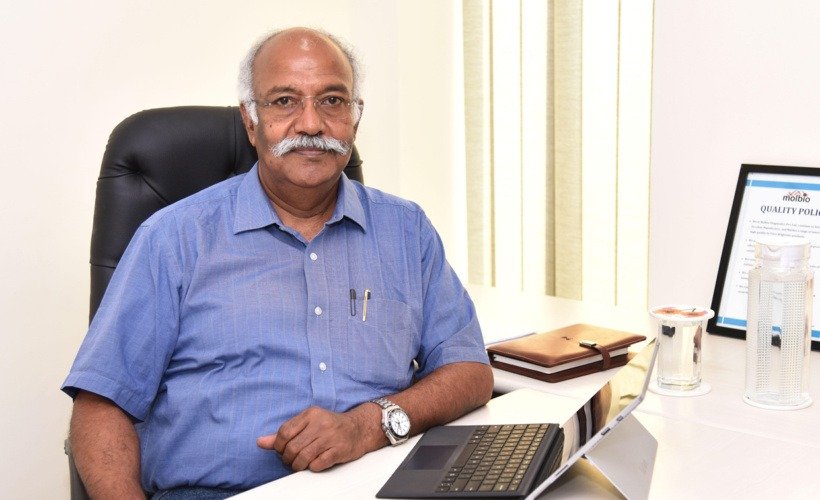
Molbio Diagnostics comes up with a quick and efficient way of testing people which is a practical platform especially in the kind of crisis we are facing today
Sriram Natarajan, a technocrat, is the founder Director and Chief Executive Officer of Molbio Diagnostics Pvt. Ltd. Apart from holding M.Sc, M.Phil. degrees, has also has four years of academic research experience. Also 34 years of experience in developing, manufacturing and marketing of Diagnostic devices and kits. These products cater to worldwide markets in both the private as well as public sector.
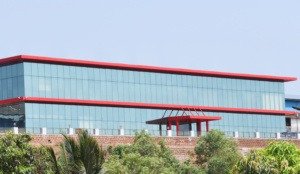
The True lab Real Time quantitative micro PCR system from Molbio Diagnostics brings PCR technology right to the point-of-care.At all the laboratory and non-laboratory settings, primary centres essentially at all levels of healthcare including in the field i.e near the patient. Molbio has decentralized and democratised access to molecular diagnostics. With growth in variety of infectious diseases, this rapid and portable technology enables early and accurate diagnosis. Thus, enabling timely initiation of correct treatment right at the first point of contact. The platform is infrastructure independent and provides a complete end to end solution for disease diagnosis. With proven ability to work even at Primary Health Centers and with wireless data transfer capability, this game changing technology brings in a paradigm shift to the global fight in control and management of devastating infectious diseases.
The system works on disease specific Truenat microchips for conducting a real time PCR. The sample preparation (extraction and purification) is done on a fully automated, cartridge based Trueprep AUTO sample prep device.
Sriram speaks about Molbio’s Covid-19 real time PCR test and further plans of expansion.
The Indian Council of Medical Research (ICMR) has approved of the test kits, which can give results in an hour and half.
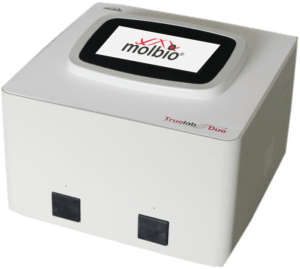
“This is an innovation which has happened from our company with complete Indian Technology, which is called Point of Care Real Time macro PCR. PCR has always been the domain of Central laboratories. The nature of PCR itself is such that, only high ended, sophisticated central laboratories could do a PCR. Some of the reasons probably are that they could bring in very expensive equipment, they have extremely heavy laboratory infrastructure and highly skilled people, hence PCR was always limited to big labs.
“Samples were collected from all over the country and brought to these big labs for testing. This was limiting access to PCR testing for most people and was also costing a delay in the report of results. The highly suspected patients had to wait a long time before results could be confirmed and it has even taken a couple of weeks before this could happen.”
Our technology which is called the Truenat platform brings this PCR technology into a small, portable point-of-care, model. We have battery operated and portable machines as well as kits that are stable at normal temperatures and can be deployed even at primary health care levels. It is completely user friendly and people can be trained quickly and easily to perform these tests. It can be deployed across the country and instead of samples having to travel long distances the technology itself is available at the point of contact. We do not have to waste much time and we do a single testing at a time unlike a central laboratory where they have to loads of tests. Reports are available within an hour and this makes it a highly deployable and practical kind of a platform, especially in the case of a crisis like what we have right now.”
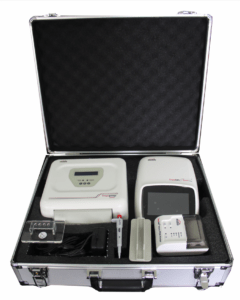
Sriram points out that as soon as the lockdown is relaxed, and people get on the move again.The need for testing is going to be very important. “We are different from other technologies in this regard and much more practical, which is a real need of the hour.”
Regarding the roll out of these test kits, Sriram explains that they have already started deploying the test kits. “Being our home state, Goa was the first to avail of this technology and at present we have five machines here. Goa has already taken abouttwo thousand test kits so far and are planning to order some more. The second state is Andhra Pradesh who already had our machines from the earlier TB installations. It was easier for the state to convert them into Corona Virus test machines.”
Sriram also adds that their machines are a multi-disciplinary platform and can be used for doing all sorts of tests. “We have tests for TB, Dengue, Swine Flu, and Malaria and so on. Andhra Pradesh has around 240 of our machines in their state and it was convenient for them to start buying our test kits and using them. We have already given them around fifty thousand test kits and they have placed an order for another fifty thousand.” Sriram’s company has also supplied a smaller number to Chhattisgarh, who have also ordered for a larger number. “A lot of things are happening at the same time.”
His company has also received an order from the central TB Division, the Ministry of Health, for around 1500 machines to be deployed across India. That order was placed for TB diagnostics but as they were to commence their roll out, the Covid came up. “Now they want to use these machines to test for the Corona virus. We have tostart deploying them as soon as possible. So by this month and the end of May we plan to deploy about around 500 of these machines across the country and they have already placed an order for 12 lakh test kits to be delivered over a period of time by end of May. At this point of time we have a commitment to the Central Government for 12 lakh test kits, we have Andhra Pradesh already using these test kits in a fairly large way and Goa, of course is also using our tests. In the next two three months we are going to see most of the states in India using our technology.”
This has been an extremely engaging and stressful period for the company.Ramping up productionhas its own challenges. Especially with the lockdown being in force. When asked about these challenges, Sriram says, “It’s a big challenge but we have also been able to find solutions. The Government of Goa has been very helpful in this regard and has given us all the required permissions to get our company going. It has also been a challenge to get our people to come to work.It took about 10 days, to convince and get them to start working. Besides this, we did not have any other issues with commencing the factory operations. The bigger problem was getting the raw materials and components. That has been quite a challenge till date.But with everything in place now, we are fairly confident we can get our materials in the state. Deliveries are also a challenge, and again we are finding solutions to this. Things are improving step by step but it is not as easy as it was earlier, much before the lockdown has been in place. Cost of materials hasalso gone up, transportation costs have seen a dramatic rise which adds to our cost. That is quite a strain as we do not want to change our pricing structure. We are trying to see how best we can manage the situation”
“Scaling up is another thing we have to do although we have built up this kind of capacity keeping the TB program in mind. It’s very clear that this scale is not sufficient, and we have to ramp up even more. We are already working on this, with some activities planned in the operations. The Andhra Pradesh Metric Zone or the APMZ is a very high ended zone and it is a way for us to commence our activities there. We should be able to scale up significantly there too.”
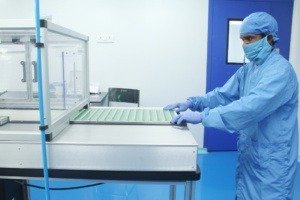 When asked about Covid-19 and when the world will see the last of it, Sriram was point blank in saying that it would be a very long time in seeing the last of Covid 19. He was positive when it came to the severity of the infection.He sstated, the Government of India has taken appropriate steps in terms of the lockdown and social distancing measures.Thanks to which the spread of the disease has been curtailed quite effectively. He did add that with the relaxation of the lockdown the risk will be significant as the virus is still lurking around and hasn’t disappeared altogether. “Every day the number of cases is increasing and though the rise in India hasn’t been like other countries the numbers are still pretty high. The moment the lockdown is relaxed, and people start moving around, the chances that it will spread are pretty high. One has to be more careful”
When asked about Covid-19 and when the world will see the last of it, Sriram was point blank in saying that it would be a very long time in seeing the last of Covid 19. He was positive when it came to the severity of the infection.He sstated, the Government of India has taken appropriate steps in terms of the lockdown and social distancing measures.Thanks to which the spread of the disease has been curtailed quite effectively. He did add that with the relaxation of the lockdown the risk will be significant as the virus is still lurking around and hasn’t disappeared altogether. “Every day the number of cases is increasing and though the rise in India hasn’t been like other countries the numbers are still pretty high. The moment the lockdown is relaxed, and people start moving around, the chances that it will spread are pretty high. One has to be more careful”
He also stressed on the testing which needs to be done, so that cases can be tracked, and appropriate measures be taken “At the same time people will have to take appropriate safety measures and follow social distancing. Social distancing will be here to stay for a pretty long time and that’s the only way to minimize the spread . Even after following all this, the virus will still be in circulation. It is just like Swine Flu. When Swine Flu came as a pandemic in 2009, it was a pretty big thing. But now it still exists in India as well as other countries. It becomes a part of other diseases and viruses. In the same way Covid will become a part of us and we would have to get used to it. I don’t think we will see the end of it in the next few years.”
As far as a vaccine is concerned Sriram says that developing a vaccine is not aneasy a task. “The efficacy of a vaccine has to be proved, one has to go through clinical trials and much as people are pretty optimistic in saying it will take one year for a vaccine, it is at least another two years away.” He also added that viruses keep mutating and one has to see how effective a vaccine will be in this regard. “Many are working on a vaccine and much as they say that things look promising, there’s a lot of work to be done and its effectiveness has to be proved.”
Sriram was asked his opinion on any viruses which will come up in the future, and if there’s any way to prevent them or handle in a better manner across the world like Covid is right now Sriram explains that there is no clear cut path as these viruses are highly unpredictable. “They can mutate very fast, it’s difficult to predict how they will mutate, and new strains keep coming up very quickly. It is not possible to develop a vaccine which will eradicate everything as one can’t make a vaccine for what you haven’t seen. Constant monitoring of such outbreaks is very important. Like China didn’t inform the world about the virus till it got out of hand. The medical systems and infrastructure have to be strengthened across the world. Especially in developing countries like India where we are able to identify as well as monitor responses and take quick action. This will help in taking preventive measures and controlling the spread of the virus.”
 Sriram also mentions that WHO should have been more vigilant with regards to Covid and wasted time in announcing it as a pandemic. “People were still flying and travelling which led to the spread of the disease. I’m not blaming them, but they are the experts and they should have known how to act and understand what is happening. There has to be a good coordination between countries globally in the case of such outbreaks and should be reported on time to the WHO or any government in this regard. Eve small outbreaks should be reported at once and information should not be withheld from the authorities. This will ensure that the spread is controlled as once it spreads it becomes very difficult to subdue it. The same happened in Wuhan where the authorities didn’t keep track of the virus and took it lightly. Due to which it was too late. We have to be vigilant, report everything so that timelyaction can be taken.”
Sriram also mentions that WHO should have been more vigilant with regards to Covid and wasted time in announcing it as a pandemic. “People were still flying and travelling which led to the spread of the disease. I’m not blaming them, but they are the experts and they should have known how to act and understand what is happening. There has to be a good coordination between countries globally in the case of such outbreaks and should be reported on time to the WHO or any government in this regard. Eve small outbreaks should be reported at once and information should not be withheld from the authorities. This will ensure that the spread is controlled as once it spreads it becomes very difficult to subdue it. The same happened in Wuhan where the authorities didn’t keep track of the virus and took it lightly. Due to which it was too late. We have to be vigilant, report everything so that timelyaction can be taken.”
Sriram states that this will happen as people are learning from this experience, but he also stresses on the strengthening of the health infrastructure in India. “We are very weak in our health infrastructure and now we are struggling, trying to organize a lot of things but everything takes time. We cannot do things overnight and we have to understand that such cases will keep cropping up in the future. We should be prepared to handle such situations.”
Sriram concludes with his coping mechanism during this time of stress. “There are a lot of things to be done but one has to do it. I’m comfortable with a lot of pressure and I’m used to it.”





